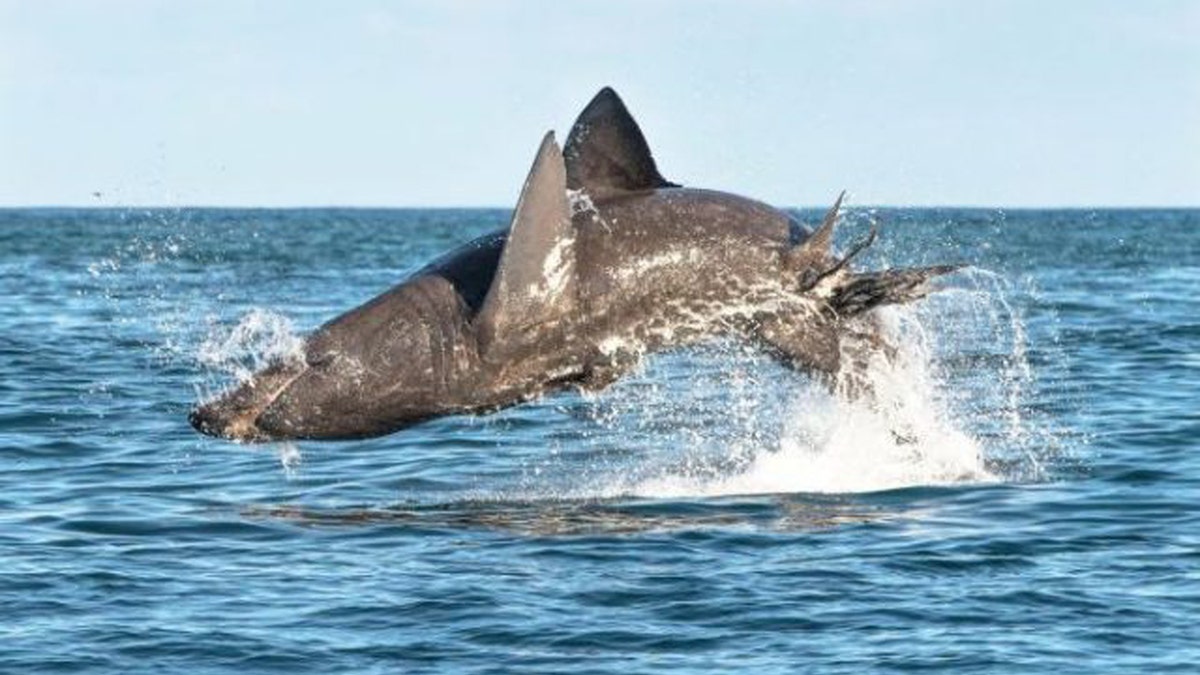
Talk about hangtime.
Basking sharks, the second largest in the world only to whale sharks, can keep up with great white sharks when it comes to leaping out of the water.
According to a study published in the scientific journal Biology Letters, basking sharks are capable of reaching a top speed of 11 mph and can get as high as 4 feet above the water, comparable to great whites.
GREAT WHITE SHARK LAIR IN PACIFIC OCEAN DISCOVERED BY SCIENTISTS
“This finding does not mean that basking sharks are secretly fierce predators tearing round at high speed; they are still gentle giants munching away happily on zooplankton,” Dr. Jonathan Houghton, Senior Lecturer in Marine Biology at Queen’s University Belfast, said in a statement.
Dr. Nick Payne, assistant professor in Zoology at Trinity College Dublin and the study's co-author, said: “The impressive turn of speed that we found basking sharks exhibit shows how much we are yet to learn about marine animals – even the largest, most conspicuous species have surprises in store, if we’re willing to look.”
By contrast, great whites are able to get up to 10.7 mph. Some researchers have witnessed great whites getting as high as 8 to 10 feet out of the water to catch their prey, according to Sharks World.
Unlike larger great whites, which are arguably the best known predator in the world and have no known natural predators (though orcas sometimes feed on them), basking sharks are docile, even being described as "slow and languid," as they look for plankton to feed on.
Basking sharks can grow up to 26 feet in length, while great whites can reach upwards of 21 feet. Whale sharks, the largest of the genus, can reach up to 33 feet.
The great white shark known as "Deep Blue" is nearly 20 feet long and is thought to be the largest great white ever caught on film.
TERRIFYING MOMENT SNORKELER REALIZES MASSIVE SHARK IS DIRECTLY BEHIND HIS FRIEND
The data was taken from a 26-foot-long basking shark spotted in 2015 in Malin Head, Ireland. The videos of the great whites "were recorded in 2009 at two sites in South Africa, where seal-shaped decoys induced feeding attempts," the statement added.
At one point, the basking shark rose from a depth of 92 feet in just over 9 seconds and lept out of the water "for one second, and its leap peaked at a height of 1.2 meters above the surface."
To do this, the shark reached a top speed of around 11 mph. "To put this into perspective, this is more than twice as fast as the average competitor in the Olympic men’s 50m freestyle swim," the researchers said.
It's presently unclear why basking sharks leap out of the water, but it does highlight genetic similarities between the species.
“It simply shows there is far more to these sharks than the huge swimming sieves we are so familiar with," Dr. Houghton continued in the release. "It’s a bit like discovering cows are as fast as wolves (when you’re not looking).”
Follow Chris Ciaccia on Twitter @Chris_Ciaccia








































